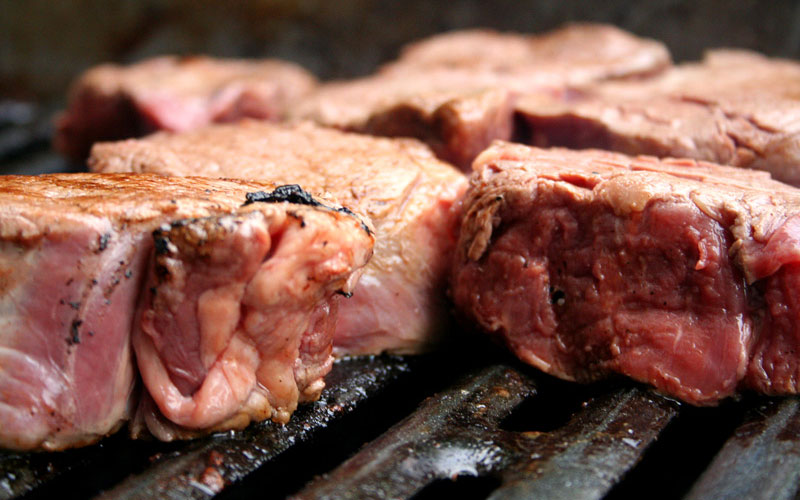
Red meat’s association with cancer is primarily linked to colorectal cancer, like processed meat, but it also has associations with pancreatic and prostate cancer, according to the World Health Organization report. (Photo via Wikimedia Commons)
Before you throw the bacon on the frying pan or order the meat lover’s pizza you may want to reconsider, after you read about the risks. A United Nations agency report released Monday stated that processed meat causes colorectal cancer, and that red meat probably causes cancer.
Each 50 gram portion of processed meat eaten daily, which would only be about two strips of bacon, increases the risk of colorectal cancer by 18 percent, according to the World Health Organization Report.
“For an individual, the risk of developing colorectal cancer because of their consumption of processed meat remains small, but this risk increases with the amount of meat consumed,” Dr. Kurt Straif, head of the International Agency for Research on Cancer, said in the report.
The WHO’s report also stated red meat “probably” causes cancer, but had “limited evidence” supporting the determination. There was strong evidence, though, that red meat still had carcinogenic effect, according to the report.
Red meat’s association with cancer is primarily linked to colorectal cancer, like processed meat, but it also has associations with pancreatic and prostate cancer, according to the report.
A panel of experts at the WHO’s International Agency for Research on Cancer, reviewed more than 800 studies that helped it come to the report’s conclusions. Much of the evidence was from studies conducted in the past 20 years, according to the report.
The Arizona Beef Council said it has looked at the much of the same science the IARC report examined and noted that none of the “best and brightest” researchers have been able to come to a conclusion that one single food group causes cancer, said Lauren Scheller, spokeswoman for the council.
“This is a leap that IARC took this stance,” she said.
Scheller said beef fits into a healthy and well balanced diet, and folks should be eating everything in moderation.
Dr. Christopher Wild, the director of IARC, said in the report that red meat has nutritional value, but its findings further support current recommendations to reduce intake of meat.
“These results are important in enabling governments and international regulatory agencies to conduct risk assessments, in order to balance the risks and benefits of eating red meat and processed meat and to provide the best possible dietary recommendations,” he said in the report.
The World Health Org. says 50g of red meat a day can increase the chance of colorectal cancer. Will you give it up?
— Cronkite News (@cronkitenews) October 26, 2015
Not all meat is processed meat, but it is best to maintain a plant based diet, especially when fighting cancer, said Cynthia Thomson, director of the University of Arizona Canyon ranch Center for Prevention and Health Promotion.
“(Processed meat) is different and that we add chemicals to it and sodium… and those things are the problem,” she said.
The risks vary from person to person, and the amount of processed meat it takes to increase a person’s risk isn’t very much, she said.
“I’d say reduce your intake of processed meat and red meat. Reduce overall protein intake and increase the fruit and vegetables,” she said.